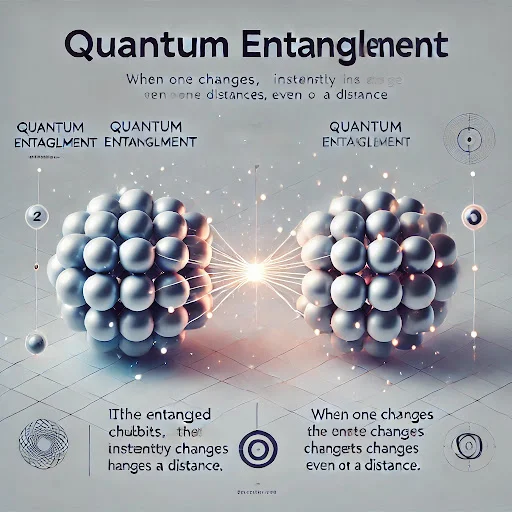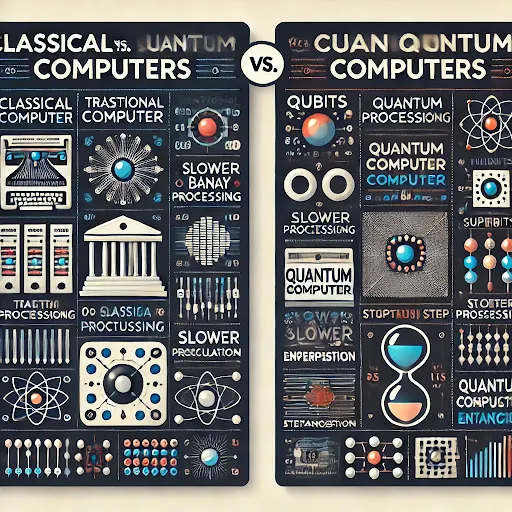Quantum Computing: The Future of Superfast Computing
Quantum Computing: The Future of Superfast Computing
Imagine a computer that can solve problems in minutes—problems that would take even the most powerful supercomputers thousands of years. Sounds like science fiction, right? Well, welcome to the fascinating world of quantum computing!Quantum computers work on principles that are completely different from regular computers. They use the strange and powerful laws of quantum mechanics to process information in a revolutionary way. In this blog, we'll break down the key concepts of quantum computing in the simplest way possible.
What Makes Quantum Computers Special?
Traditional computers use bits to store and process data. These bits can either be 0 or 1—just like a light switch that is either ON or OFF. However, quantum computers use qubits, which are much more powerful.A qubit can be 0 and 1 at the same time—this is called superposition. Because of this, quantum computers can process multiple possibilities at once, making them incredibly fast and powerful.
Key Concepts of Quantum Computing
1. Qubits – The Building Blocks
- A qubit is the fundamental unit of quantum computing.
- Unlike classical bits, qubits can be in multiple states at once, thanks to superposition.
- The more qubits a quantum computer has, the more powerful it becomes.
2. Superposition – Doing Multiple Calculations at Once
- Classical computers process information in a step-by-step manner.
- Quantum computers, due to superposition, can handle multiple operations simultaneously.
- This allows them to solve complex problems much faster than traditional computers.
🔹 Example: Imagine you are lost in a maze. A classical computer would try every possible path one by one. But a quantum computer, using superposition, would explore all paths at the same time—helping you find the way out instantly!
3. Entanglement – A Quantum Connection
- Entanglement is a mysterious quantum property where two qubits become linked, no matter how far apart they are.
- If you change one qubit, the other instantly changes too—even if it is on the other side of the universe!
- This property is the key to ultra-fast computing and secure quantum communication.
🔹 Example: Think of entangled qubits like a pair of magical dice. If you roll one and get a six, the other one will also show a six—no matter how far apart they are!
4. Decoherence – The Biggest Challenge
- Qubits are very delicate and can lose their quantum state due to outside disturbances (heat, noise, etc.).
- This is called decoherence, and it makes building quantum computers very challenging.
- Scientists are working on ways to protect qubits and make quantum computers more stable.
How Do Quantum Computers Work?
Unlike classical computers, which use traditional logic gates (AND, OR, NOT), quantum computers use quantum gates that manipulate qubits using superposition and entanglement.
🔹 Example: A famous quantum algorithm called Shor’s Algorithm can break complex encryption codes in seconds, something classical computers would take millions of years to do!
Where Can We Use Quantum Computing?
Quantum computers have the potential to transform many fields:
1. Cybersecurity & Cryptography
- Quantum computers can crack even the strongest encryptions, forcing companies to develop new, quantum-safe security measures.
2. Medicine & Drug Discovery
- Simulating molecules at a quantum level will help scientists design new medicines faster and more accurately.
3. Artificial Intelligence (AI) & Machine Learning
- AI models will become far more powerful with quantum computing, leading to breakthroughs in deep learning and data analysis.
4. Climate Science & Weather Forecasting
- Quantum computers will help predict climate changes more accurately, leading to better disaster management.
5. Financial Modeling & Stock Market Analysis
- They will help banks and investors analyze financial markets in real time, reducing risks and improving decision-making.
Challenges of Quantum Computing
Even though quantum computing sounds amazing, it is still in its early stages. Here are some major challenges:
1. Building Stable Quantum Computers
- Qubits are very sensitive and require extremely cold temperatures (near absolute zero) to function properly.
2. Error Correction
- Because quantum states are delicate, quantum computers are prone to errors. Scientists are working on quantum error correction methods.
3. High Cost
- Quantum computers require advanced technology and massive funding, making them very expensive.
Current Progress in Quantum Computing
Big tech companies like IBM, Google, Microsoft, and Amazon are investing heavily in quantum computing research.
- Google’s Sycamore Quantum Computer solved a problem in 200 seconds that would take a supercomputer 10,000 years!
- IBM has developed quantum computers that businesses can access via the cloud.
- China is also making rapid progress in the field.
Conclusion: The Future is Quantum!
Quantum computing is not just a futuristic dream—it is becoming a reality. Though we still have challenges to overcome, the potential benefits are enormous. In the coming years, quantum computing will revolutionize science, medicine, AI, and even the way we secure our data.
We are standing at the dawn of a quantum revolution—one that will change the world as we know it. So, if you’re fascinated by the future of technology, keep an eye on quantum computing—it’s going to be BIG!







Comments
Post a Comment
Thanks for messaging Aradhya Study Point.
We will reply as soon as possible.